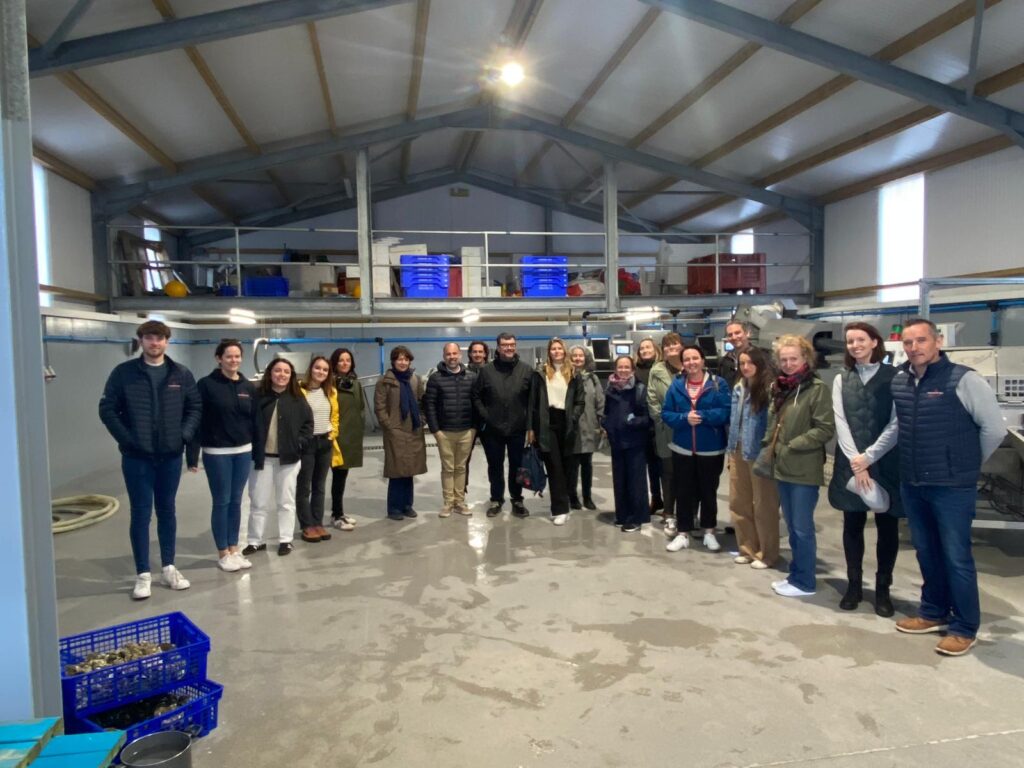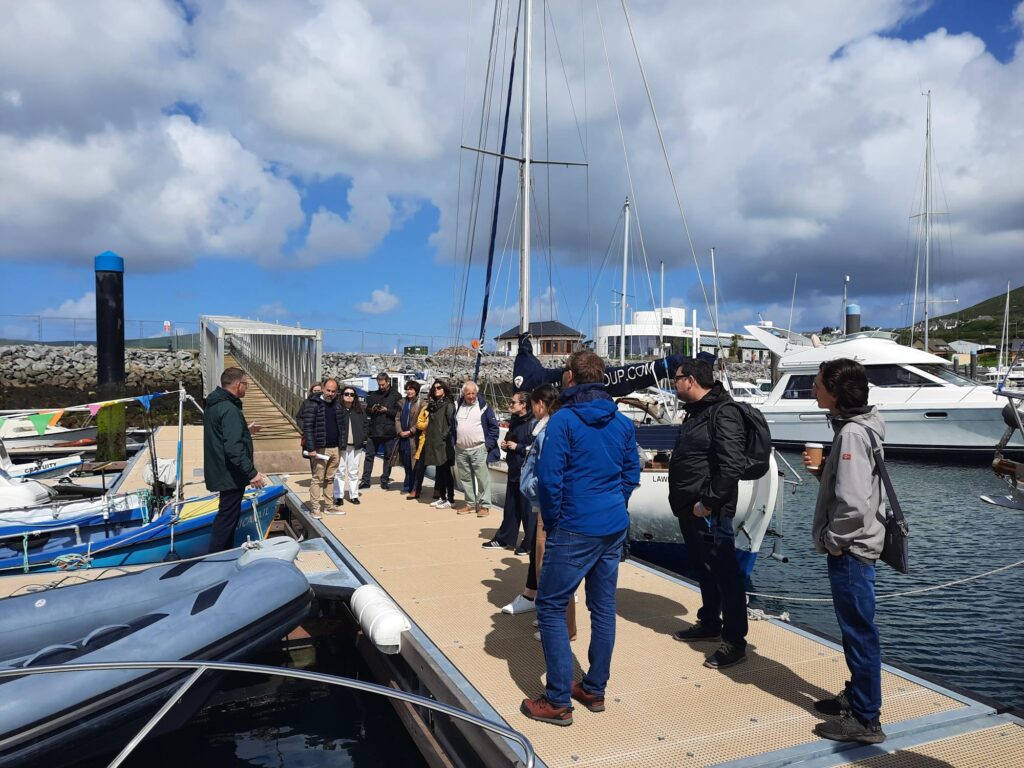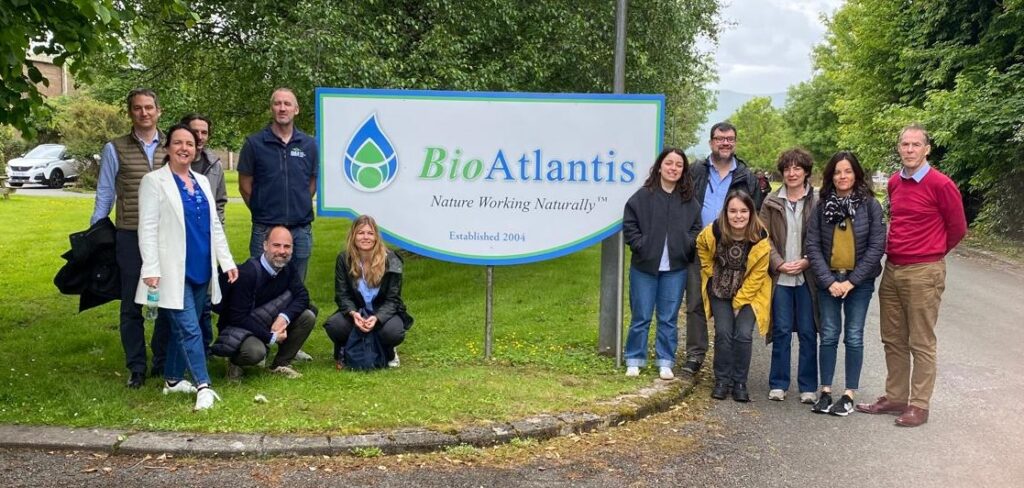
Ireland – 5th and 6th of June
Second site visit for the FISHINN consortiumMunster Technological University host FISHINN Interreg Atlantic Area knowledge exchange fieldtrip to Ireland’s west coast fisheries ecosystem: June 5th & 6th 2024 – Synopsis of the local fishing industry, innovation capabilities and reflection on the challenges and opportunities for diversification in the Blue Economy.

As part of the European project FISHINN, co-financed by the Interreg Atlantic Area program, project partners and key local stakeholders in a two-day knowledge exchange series designed to support local fisheries and provide collaborative opportunities between Irish, French, Portuguese, and Spanish partners. The visit was coordinated by the Circular Bioeconomy Research Group and Circular Bioeconomy Cluster team at MTU Kerry.
Day 1 commenced with a series of meetings in the port of Dingle, renowned for its proud fishing history, the town has built a very strong blue tourism sector despite an overall decline in the fishing industry. The consortium was first welcomed from the directors and staff of the Oceanworld Dingle Aquarium, founded by Kevin Flannery who is a champion for local fishers in the preservation and maintenance of fishing in this region. Kevin’s vision was outlined to the partners as the business promotes ocean awareness and stewardship through education, research, and conservation of endangered species.
The consortium had the pleasure of being given a guided tour of the Dingle Port facilities by both the current Harbour Master Nigel Collins and his predecessor Brian Farrell who have been managing the marina and port facilities for a number of decades. Under their combined stewardship many significant developments have enhanced port facilities and services. These include the installation of state-of-art pontoons, increased berthing activity, amenities for visiting yachts and boats and a suite of ancillary services for fishing vessels and crews.

Dingle port offers comprehensive services such as refuelling, maintenance, and waste disposal, catering to the needs of both local and international sailors. The addition of Wi-Fi, secure access, and modern shower and laundry facilities has greatly improved the experience for visitors. The marina plays a crucial role in supporting local tourism, with boat tours, eco-tourism ventures, and marine research activities thriving in the area. Events such as regattas and maritime festivals have become annual highlights, drawing enthusiasts from around the world. These developments have not only boosted the local economy but also reinforced Dingle Marina’s status as a vibrant and essential part of the community, blending its rich maritime heritage with contemporary maritime culture.
Failte Ireland is the national organisation responsible for supporting Ireland’s tourism industry and sustaining Ireland as a high-quality and competitive tourism destination. They have an office location in the harbour facility where a presentation on the key impacts of the ‘Wild Atlantic Way’ blue tourism promotional campaign was delivered by project officer Declan Murphy outlining its success in revitalising coastal regions, towns and villages along the west coast of Ireland.
Director of the National Inshore Fishermen’s Association (NIFA) Eddie Moore, provided an overview of the association, highlighting its role in representing the interests of inshore fishermen across Ireland. NIFA advocates for a more equitable distribution of subsidies and resources to ensure that small-scale fishermen receive adequate support in recognition of the vital role fishers play on the promoting and delivery of sustainable fishing practices that protect marine ecosystems.
A stakeholder lunch event was hosted by The Fish Box, a newly established seafood brasserie owned and managed by the next generation of the Flannery family, brother & sister duo Mihael and Fiona. Created with sustainability at the core of the business and fish-to-fork direct from the Atlantic waters serving a wide range of fresh fish and shellfish options and locally sourced produce.
A scenic boat trip with Dingle Boat Tours took the visitors across the peninsula from Dingle to Reenard Point is the location of Quinlan’s Kerry Fish, a renowned seafood business with humble beginnings that have grown into a thriving enterprise. Fishers from Portmagee, Caherciveen and throughout the peninsula supply a range of fresh seafood products to this successful processing plant. Founded by the Quinlan family in County Kerry, when the company, which was founded in 1963 by a Danish firm, ran into difficulties in the late 1960s, the workers bought it out, then brothers Michael, Fintan and Liam Quinlan began fishing for a living. Initially selling their catch locally, the brothers quickly gained a reputation for providing the freshest and highest quality seafood.
Quinlan’s Kerry Fish operates a network of fish shops, seafood bars, and restaurants across Ireland providing value add to the business with both a B2B and B2C value chain Despite their growth and success, the Quinlan family remains true to their roots, maintaining their core values of quality, sustainability, and community engagement.
FISHINN partners were welcomed with an oyster tasting session at Cromane Bay Shellfish. The company is owned and operated by brothers Patrick T O’Sullivan and Joseph O’Sullivan supported by expert business consultant Jennifer Boyle. Their family heritage spans five generations of fishermen working and living in Castlemaine Harbour. The oysters are harvested by hand and shipped to France, Holland and local hotels and restaurants throughout Ireland. These Irish Rock Oysters are traditionally and sustainably farmed in the clear waters of Cromane Bay in Castlemaine Harbour, Co. Kerry. A key next step in the development of the product and business is the building of their own purification plant on the other side of the bay which will allow another layer of value add and open new international markets for this prized oyster product.
Day 1 concluded with a stakeholder dinner at the famous Jacks Coastguard Restaurant serving the finest seafood dishes and accompanying local produce with incredible views across the bay. Jacks’ Coastguard Restaurant is an award-winning restaurant located in the beautiful fishing village of Cromane just minutes off the Ring of Kerry and Wild Atlantic Wao wend by Brian and Graine Keary.

DAY 2
BioAtlantis is an exemplar of blue biotechnology in Ireland, located in Tralee, Co. Kerry. CEO, John T. O’Sullivan and his team welcomes the FISHINN consortium for a site visit showcasing exceptional facilities in the identification and extraction of bioactives from seaweed for the creation of nutraceuticals. During the presentation, BioAtlantis presented their efforts in providing natural compounds derived from renewable marine and terrestrial sources to reduce stress in crops, animals, and humans by enhancing natural defence systems. The main market drivers identified were climate change, crop failure, the rise of organic farming, and concerns over chemical residues in food. Also, sustainability was emphasized, focusing on plant operating efficiencies, carbon footprint reduction, and sourcing environmentally friendly raw materials.
The external industry stakeholders were taken on a tour of the Tralee Bay Oyster Fishery Society facilitates in Fenit, one of FISHINN study ports. In Fenit we heard from Catherine Butler, Shellfish Development Executive with Bord Iascaigh Mhara. Catherine spoke of the role of BIM in helping to develop the Irish Seafood Industry by providing technical expertise, business support, funding, training and promoting responsible environmental practice. Jessica Giannoumis, Ireland Aquatech Community Manager at Hatch Blue Ireland spoke about the Irish Aquatech market and the Hatch BIM Aquatech innovation studio. MTU discussed their role in working with the Tralee Bay Oyster Fishery Society in protecting the native oyster beds and a representative from Tralee Bay Oyster Fishery Society highlighted the challenges and successes in their daily operations.
Tralee Bay Oyster Fishery Society, located in County Kerry, on Irelands Wild Atlantic Way, is one of the few self-seeding Native Wild Irish Oyster Fisheries found in Europe. The Tralee Bay Oyster fishery is one of the largest self-reproducing oyster beds in Western Europe, which is something they are working extremely hard at protecting. Tralee Oyster Fisheries Society Ltd was established in 1979 and is a non-profit fishermen’s co-op involving 78 boats and over 200 fishers. Annual catch ranges from 100 to 300 tonnes per year, depending on the settlement level of the spat / juveniles from 4 years previously. Ensuring the health and ecological protection of this stock is of the highest priority to the society, ensuring they have one of the most sustainable seafood products on the market.
Simultaneously the project partners held meeting took place at Munster Technological at the Tom Crean Business Centre on the university campus facilities. This meeting provided updates on project deliverables and the design of the phase 2 of the FISHINN Interreg Project which is to create a map of best practice innovation across the partner regions with a view to developing collaborative opportunities for blue economy development between partner entities, companies and local fisheries ecosystems in Ireland (Kerry), Portugal (Sines), France (Brittany) and the Basque Region of Spain.
Munster Technological University Team: Eve Savage, Catriona Power, David Barry, Jennifer Attard and Helena McMahon
